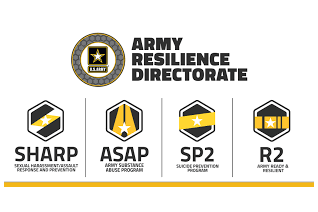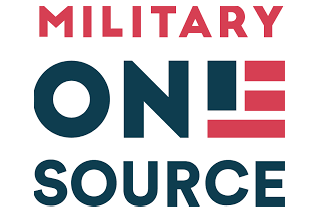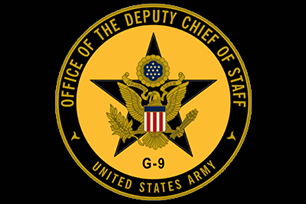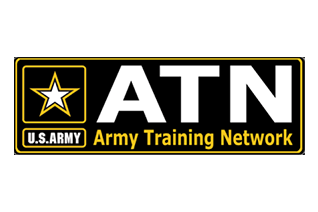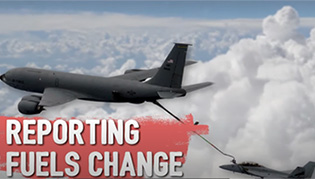Sexual Harassment Assault Response and Prevention
(SHARP)

Mission
Enhance TRADOC readiness through the prevention of sexual assault, sexual harassment and associated retaliatory behaviors while providing comprehensive response capabilities.
Vision
Eliminate sexual assaults and sexual harassment by creating a climate that respects the dignity of every member of the Army family.

Ms. Simone M. Hall – SHARP Program Manager
As SHARP Program Manager at the Division HQ, Center of Excellence, Major Subordinate Command (MSC) HQ, or Army’s largest installations. The incumbent manages the Sexual Harassment/ Assault Response and Prevention (SHARP) Program for a typical serviced population of at least 10,000 which includes Soldiers and family members as well as OCONUS Department of Army civilians and contractor personnel authorized to accompany US Forces OCONUS in contingency operations.
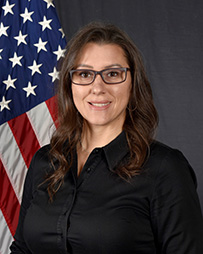
Ms. Angela Tocci – Assistant Program Manager
As HQ TRADOC Assistant SHARP Program Manager at the Division HQ, Center of Excellence, Major Subordinate Command (MSC) HQ the incumbent resolves issues, provides information and recommendations based on statistical data. Responsible for gathering and analyzing data and recommending improvements in data gathering/ analysis related to sexual harassment and sexual assault and conducts on-site data gathering, closely monitors data, draws conclusions and prepares/distributes reports.
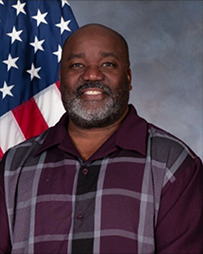
Mr. Reginald T. Patterson – Assistant Program Manager
As a HQ TRADOC Assistant SHARP Program Manager at the Division HQ, Center of Excellence, Major Subordinate Command (MSC) HQ responsible for compliance with policy, advising on the development of program objectives, policies, and performance measures for program effectiveness, with the intent of reinforcing the Army’s commitment to eliminate incidents of sexual harassment and assault through a comprehensive policy that centers on awareness, prevention, training, education, victim advocacy, response, reporting, and follow-up actions. .

Josh Stevens – Program Compliance Specialist
Serves as SHARP Program Compliance Specialist, responsible for planning and coordinating a variety of services functions that are principally work-supporting. Communicate administrative policy, goal, mission, and philosophy to all levels of organization using a comprehensive knowledge of written and verbal communication. Ensure efficient and effective flow of administrative information between MACOM, Directorate and subordinate units. Develop guidance on administrative techniques and methods of improvement. Develop manuals and directives covering the administrative aspects of operations.
Sexual Assault and Sexual Harassment
Information
Resources
SEXUAL ASSAULT REPORT – UNRESTRICTED
Sexual assault is a crime. Sexual assault is intentional sexual contact characterized by use of force, threats, intimidation, or abuse of authority or when the victim does not or cannot consent. The term includes a broad category of sexual offenses consisting of the following UCMJ offenses: rape, sexual assault, aggravated sexual contact, abusive sexual contact, or attempts to commit these acts. There are two reporting options for sexual assault: restricted reporting and unrestricted reporting.
A victim can disclose that they are the victim of a sexual assault to a SARC, SHARP VA, VR, HCP, command authorities, or others. The victim will have access to medical treatment and counseling, support, and consideration for protection orders and expedited transfers. If the victim chooses to file an unrestricted report, the SARC, SHARP VA or VR, HCP, chain of command, and law enforcement, will be notified that the crime was reported. An official investigation will be triggered, and the subject may be prosecuted.
A commander who receives an unrestricted report of a sexual assault will immediately refer the matter to USACIDC. A commander cannot investigate any report of sexual assault or delay immediately contacting USACIDC. (4) If a supervisor of a Soldier becomes aware of a sexual assault involving a Soldier, the supervisor is required to inform the Soldier’s commander immediately. (5) Commanders will provide final disposition of sexual assault cases in accordance with AR 190 – 45
This reporting option triggers an investigation, command notification, and allows a person who reports sexual assault to access healthcare treatment and the assignment of a SARC and a SHARP VA or VR. When a sexual assault is reported through unrestricted reporting, a SARC will be notified and respond or direct a SHARP VA or VR to respond, offer the victim emergency healthcare and an optional forensic exam, explain the contents of the DD Form 2910, and request that the victim elect a reporting option on the form.
All unrestricted reports will be referred to USACIDC, regardless of severity. Once a victim files an unrestricted report, it cannot be converted to a restricted report. If at any time a victim declines to participate in an investigation or prosecution, that decision should be honored by commanders, investigators, and all other personnel involved in the case.
SEXUAL ASSAULT REPORT – RESTRICTED
Sexual assault is a crime. Sexual assault is intentional sexual contact characterized by use of force, threats, intimidation, or abuse of authority or when the victim does not or cannot consent. The term includes a broad category of sexual offenses consisting of the following UCMJ offenses: rape, sexual assault, aggravated sexual contact, abusive sexual contact, or attempts to commit these acts. There are two reporting options for sexual assault: restricted reporting and unrestricted reporting
The restricted reporting option is only available to Soldiers and Family members aged 18 and older. DA Civilians wishing to file a restricted report should consult with a SARC, SHARP VA, or SHARP VR. If a victim elects this reporting option, a victim may convert a restricted report to an unrestricted report at any time. The conversion to an unrestricted report will be documented with a signature by the victim and the signature of the SARC or SHARP VA or VR in the appropriate block on the DD Form 2910..
A victim can disclose that they are the victim of a sexual assault to a SARC, SHARP VA, VR, HCP, command authorities, or others. The victim will have access to medical treatment and counseling, support, and consideration for protection orders and expedited transfers. If the victim chooses to file an unrestricted report, the SARC, SHARP VA or VR, HCP, chain of command, and law enforcement, will be notified that the crime was reported. An official investigation will be triggered, and the subject may be prosecuted.
This reporting option does not trigger an investigation. The Station Commander is notified a sexual assault has been reported, but is not given the victim’s name or other PII. Restricted reporting allows Soldiers and Family members age 18 and older who are sexual assault victims to confidentially disclose the assault to specified individuals (SARC, SHARP VA, or VR,) and receive healthcare treatment and the assignment of a SARC and SHARP VA or VR.
For restricted and unrestricted reporting purposes, a report can be made to healthcare personnel, but healthcare personnel will then immediately contact the SARC or SHARP VA to explain and complete the DD Form 2910. Healthcare personnel can preserve the restricted reporting option; disclosures to them do not trigger an investigation. Healthcare personnel may not assist with the DD Form 2910.
SEXUAL ASSAULT REPORT – NATIONAL GUARD
National Guard and Reserve Component members can make a report of sexual assault to the SAPR Program regardless of when the assault occurred.
Regardless of your duty status at the time that the sexual assault occurred, or at the time that you are seeking help, National Guard and Reserve Component members can elect either the Restricted or Unrestricted Reporting option and have access to a SARC and a SAPR VA.
However, medical entitlements remain dependent on a line of duty (LOD) determination as to whether or not the sexual assault incident occurred in an active duty or inactive duty training status.
If you’re reporting a sexual assault that occurred prior to or while not performing active service or inactive training, you will be able to receive limited SAPR support services from a SARC and a SAPR VA and are eligible to file a Restricted or Unrestricted Report.
The following classifications of National Guard and Reservists can make a Restricted Report:
Title 32 or Traditional Drilling Status
Inactive Duty for Training (IDT)
- Annual Training
- Active Duty Operational Support (less than 30 days)
- Title 10, Active Duty
- Title 32, Active Guard/Reserve (AGR)
SEXUAL HARASSMENT COMPLAINT – DEFINED
- Conduct that involves unwelcome sexual advances, requests for sexual favors, and deliberate or repeated offensive comments or gestures of a sexual nature when— Submission to such conduct is made either explicitly or implicitly a term or condition of a person’s job, pay, or career; or (b) Submission to or rejection of such conduct by a person is used as a basis for career or employment decisions affecting that person; or (c) Such conduct has the purpose or effect of unreasonably interfering with an individual’s work performance or creates an intimidating, hostile, or offensive working environment; and (d) Is so severe or pervasive that a reasonable person would perceive, and the victim does perceive, the environment as hostile or offensive.
- Any use or condonation, by any person in a supervisory or command position, of any form of sexual behavior to control, influence, or affect the career, pay, or job of a member of the Armed Forces or a Civilian employee of the DoD.
- Any deliberate or repeated unwelcome verbal comment or gesture of a sexual nature by any member of the Armed Forces or Civilian employee of the DoD.
- Verbal Sexual Harassment: Examples include telling sexual jokes; using sexually explicit profanity, threats, sexually oriented cadences, or sexual comments; whistling in a sexually suggestive manner; and describing certain attributes of one’s physical appearance in a sexual manner.
- Nonverbal Sexual Harassment: : Examples include cornering or blocking a passageway; inappropriately or excessively staring at someone; blowing kisses; winking; or licking one’s lips in a suggestive manner. Nonverbal sexual harassment also includes offensive printed material (for example, displaying sexually oriented pictures or cartoons); using electronic communications as defined in paragraph.
- Physical Sexual Harassment: contact. Examples include: touching, patting, pinching, bumping, grabbing, kissing; or providing unsolicited back or neck rubs. There is significant overlap between that physical contact which constitutes sexual assault and that physical contact which constitutes sexual harassment.
SEXUAL HARASSMENT COMPLAINT – ANONYMOUS
An anonymous complaint is defined as a report of sexual harassment, regardless of the means of transmission, from an unknown or unidentified source. The individual reporting the information is not required to divulge any PII. Commanders will publicize and enable anonymous reporting through organizational hotlines, email, or official telephone lines.
The Memorandum for Record should contain the following information, if available: date and time the information was received; a detailed description of the facts and circumstances included in the complaint; date and time the complaint was resolved and by whom; any other pertinent information; and signed by the commander.
Actions taken regarding anonymous complaints will depend upon the extent of information provided in the anonymous complaint. If an anonymous complaint contains sufficient information to permit the initiation of an investigation (such as, who committed the act(s), what the aggrieving behavior is, when the act(s) occurred, where the act(s) occurred, unit(s) of assignment for the complainant and the subject), the commander will initiate an inquiry or investigation in accordance with this instruction. If an anonymous complaint does not contain sufficient information to permit the initiation of an investigation, the complaint will be documented in a Memorandum for Record and maintained by the brigade SARC under double lock and key.
SEXUAL HARASSMENT COMPLAINT – INFORMAL
An informal sexual harassment complaint is a complaint that a complainant does not wish to file in writing on a DA Form 7746. Typically, those issues that can be resolved through discussion, problem identification, and clarification of the issues. The SARC will provide information regarding support services that are available to help resolve the complaint, as appropriate, both on and off-post (health care, counseling, chaplains, legal assistance, and unit or installation trained mediators for alternative dispute resolution).
If the commander investigates an informal complaint, the SARC will inform the complainant. The complainant may then decide not to pursue the complaint or complete a DA Form 7746. If the complainant does not fill out a DA Form 7746, an MFR, without PII, will be filed by the SARC locally, detailing the complaint and the response to that complaint. The SARC will also enter the relevant information into ICRS
An informal complaint is not subject to regulatory timeliness standards but should be resolved within 14 calendar days of the complaint receipt. When involved, SARCs will update named complainants and victims, within the limitations of the Privacy Act and the FOIA, on the progress of the complaint status every 14 days from complaint receipt until it is closed. Within 14 days of being informed of the resolution, the complainant will accept informal resolution actions, submit a formal complaint, or decline to pursue the complaint further..
The SARC receiving the complaint will not provide mediation themselves but can refer the complainant or victim to another mediator. SARCs who receive or discuss informal resolution of sexual harassment complaints will maintain a memorandum of record regarding the complaint and resolution actions taken. The SARC will ensure that the complainant understands that if a commander is informed of a complaint of sexual harassment, by the complainant or another party, the commander will inquire into the matter
An informal complaint is not subject to regulatory timeliness standards but should be resolved within 14 calendar days of the complaint receipt. When involved, SARCs will update named complainants and victims, within the limitations of the Privacy Act and the FOIA, on the progress of the complaint status every 14 days from complaint receipt until it is closed. Within 14 days of being informed of the resolution, the complainant will accept informal resolution actions, submit a formal complaint, or decline to pursue the complaint further..
SEXUAL HARASSMENT COMPLAINT – FORMAL
There are three mechanisms by which complaints of sexual harassment are recorded by the servicing full-time brigade SARC as formal complaints.
- DA Form 7746. Soldiers can file formal sexual harassment complaints on the DA Form 7746, documenting the nature of the complaint and the requested remedies.
- Additionally, when an anonymous complaint is elevated to the commander and the commander determines that the complaint contains enough information to conduct an investigation, these anonymous complaints will be processed formally and will be documented on the DA Form 7746.
- Entry in ICRS. Any informal complaint investigated by the commander will, unless the complainant files a formal complaint on the DA Form 7746, be entered into ICRS as a formal complaint with the commander entered as the complainant.
The full-time brigade SARC will refer all formal complaints to the BDE commander immediately. The commander will have the complainant swear to the contents of the statement(s) contained in the formal complaint by administering an oath to the complainant, in accordance with this regulation. At that time, the commander will inform the complainant of the potential adverse consequences to knowingly submitting a false complaint;
Upon receipt of a complaint, commanders will commence or cause the commencement of an investigation or inquiry within 72 hours and will forward the complaint to the first commander in the chain of command with GCMCA within 72 hours of receipt. The investigation will be conducted at the level which a thorough examination of the facts can be achieved. To the extent practicable, investigations should be completed no later than 14 calendar days after the date on which the investigation is initiated.
DSAID is a centralized case-level database, which collects and maintains information on sexual assaults involving Armed Forces members. DSAID gives Sexual Assault Response Coordinators (SARCs) the enhanced ability to provide comprehensive and standardized victim case management.
TDSAID benefits victims by providing proof when victim ETS, PTS, chapter or retire from military in order to receive VA benefits.
DSAID is a Common Access Card-enabled system and is accessed from a .mil network by authorized individuals.
The form can be used by the SARC capturing victim information to be entered into DSAID. It is also used to provide information to a Commander so they may create a SAIRO; The DD Form 2965 must be destroyed within 8 days after a sexual assault was reported.



